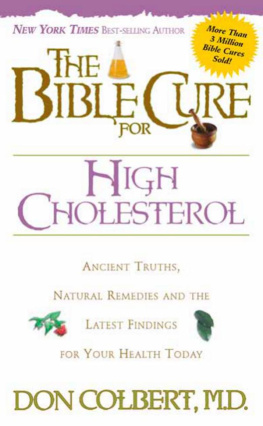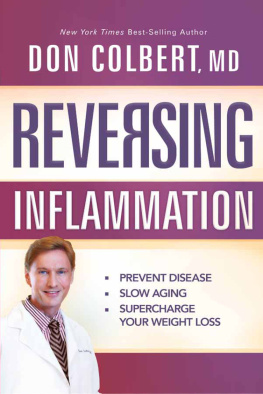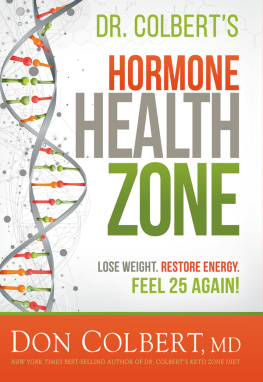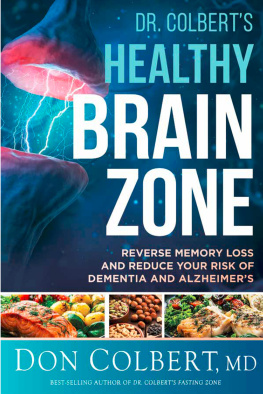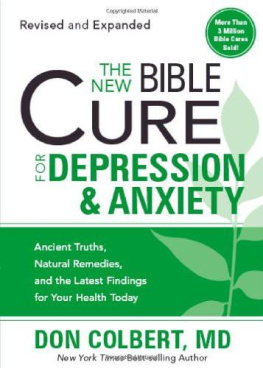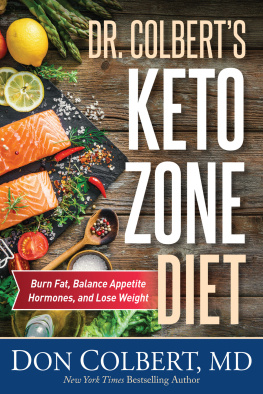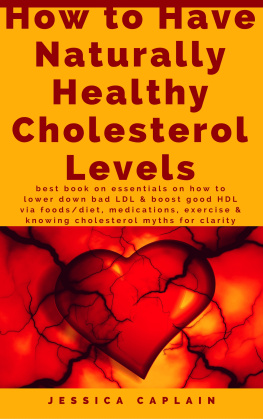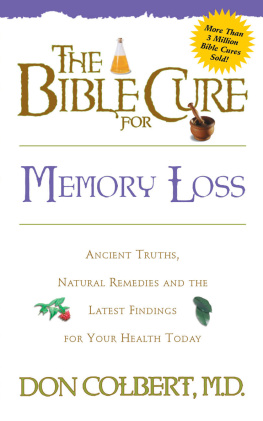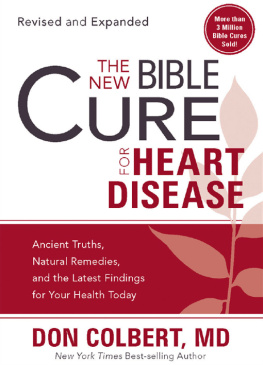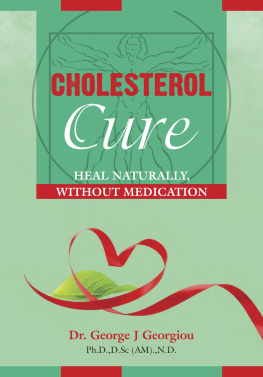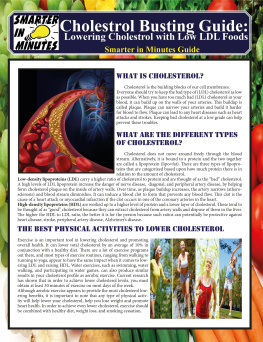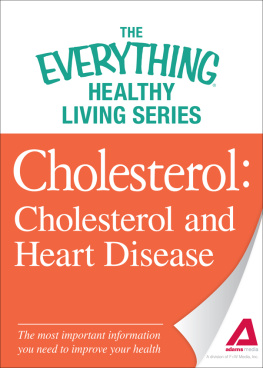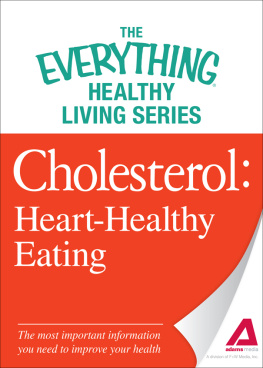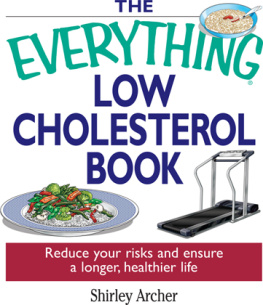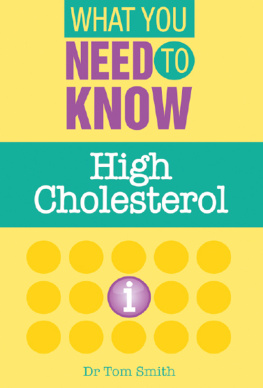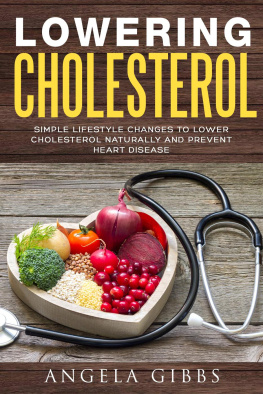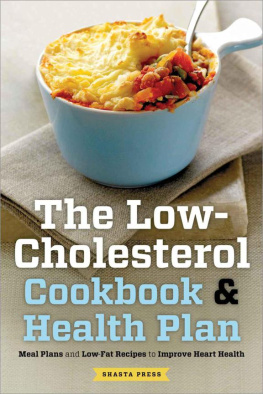Chapter 2
The Jekyll-and-Hyde Nutrient of the Body

I f you recall the story of Dr. Jekyll and Mr. Hyde, you know that they were one and the same persononly with two very different personalities. One was a relatively kind doctor, but the other was an evil monster who emerged in certain situations. In much the same way, cholesterol can be considered the Jekyll-and-Hyde nutrient of your body. There is a good type of cholesterol (HDL)which can lower your blood pressure and prevent diseaseand there is a bad type of cholesterol (LDL) that is very detrimental to your health.
What Is Cholesterol?
Cholesterol itself is actually a soft, waxy, white substance that is found in animal food products such as red meat, poultry, eggs and dairy products. We need cholesterol to help create cell membranes for the approximately 60 to 100 trillion cells in our bodies. Cholesterol is also essential for the formation of steroid hormones, such as testosterone, progesterone and estrogen. It is necessary for the formation of bile acids and in the conversion of sunlight to vitamin D for your bodys use.
But he was wounded and crushed for our sins. He was beaten that we might have peace. He was whipped, and we were healed!
ISAIAH 53:5
About 1,000 mg of cholesterol are produced by the liver each dayall that the human body really needs to function. But Americans consume approximately another 400 to 500 mg each day in their diets.
Because cholesterol is soluble only in fat and cannot be dissolved in the bloodstream, it requires special carriers to transport it in the blood. These carriers are proteins, which encapsulate the cholesterol or lipo; thus they are called lipoproteins. It is through the presence of these lipoproteins that we can determine a persons cholesterol levels.
Lets look at several of these lipoproteins and see how they affect the cholesterol levels in your body.
HDL cholesterol (a.k.a. Dr. Jekyll)
HDL (high-density lipoprotein) is responsible for transporting one-third to one-fourth of the cholesterolaway from the arteries and back to the liver where it is eliminated from the body. HDL actually removes cholesterol from the arterial lining, which can build up in the arteries, forming plaque, and cause coronary disease and heart attacks. For this reason, HDL cholesterol is referred to as the good, Dr. Jekyll side of cholesterol.
As I mentioned, HDL acts like a police officer patrolling our arteries, carrying cholesterol out of the arteries and depositing it in the liver so that it can be removed from the body. The higher the level of HDL, the lower the risk of heart disease.
It is well known that regular aerobic exercise, small amounts of red wine (one to two 4-ounce glasses a day) and the B vitamin niacin all raise HDL levels. New research is showing that dark chocolate is able to raise HDL cholesterol also. One ounce of dark chocolate contains 10 times more antioxidants than a strawberry, according to Penny Kris Etherton, N.D., Ph.D., professor of nutrition at Penn State University.
LDL cholesterol (a.k.a. Mr. Hyde)
LDL (low-density lipoprotein) is the primary carrier of cholesterol in the blood. If too much LDL is circulating, it can slowly build up as plaque in the arteries and can be especially dangerous in those arteries that supply blood to the heart and the brain. Clogged arteries in these areas can lead to deadly heart attacks and strokes. You will soon learn what raises LDL cholesterol and how to lower it.
Whats My Cholesterol Ratio?
Your doctor will determine your cholesterol ratio by dividing your total cholesterol level by your HDL number. This gives him an idea of what your risk for coronary disease due to cholesterol actually is. The ideal ratio to reach is 3.5 to 1 or lower. Decreasing just one unit from this ratio can dramatically reduce your risk for a heart attack.
Other Important Risk Factors
Several other risk factors for heart disease should be checked by your physicianthese are not included in a standard lipid panel.
Homocysteine levels
Homocysteine is an amino acid that, when elevated, is a potent oxidant of LDL (bad) cholesterol. While everyone has homocysteine in his or her blood, genetic inheritance is the most common reason for elevated homocysteine levels. Vitamin B12 and folic acid help to convert homocysteine to the essential amino acid methionine. And Vitamin B6 helps to break down homocysteine to a harmless by-product. Because of the potential for injury to the lining of blood vessels when homo-cysteine levels are elevated, I recommend that you take a supplement like Divine Health Healthy Heart Formula to lower homocysteine levels. (See Appendix B for more information.)
Ultrasensitive or high-sensitive C-reactive protein levels
This particular protein is produced when chronic inflammation is present. It is a good predictor of cardiovascular disease because it often points to inflammation in the coronary arteries. Coronary artery disease is also a chronic inflammatory process in the arterial wall, similar to arthritis, which is a chronic inflammation of joints. Bacteria such as Chlamydia pneu-moniae, CMV, H. pylori, Borrelia burgdorferi (Lyme disease) and so forth may be the cause of smoldering infection in the coronary arteries, indicated by the elevated ultrasensitive C-reactive protein.
Fibrinogen levels
Fibrinogen is a protein in the blood that is necessary for blood clotting to take place. Elevated fibrinogen levels increase the risk of coronary artery disease about two to three times. When fibrinogen adheres to the arterial wall, it signals platelets to clump together, which can eventually cause a buildup of soft plaque or a clot. Fibrinogen levels tend to increase with increased body weight, advancing age, high blood pressure, increased stress and smoking. If your fibrinogen level is over 300, you have a much higher risk of developing heart disease.
Lipoprotein (a)
Lipoprotein (a) is an especially dangerous lipoprotein, but surprisingly, few doctors check this cholesterol level in their patients blood. High levels of lipoprotein (a) have been shown to dramatically increase the risk of heart disease. In fact, one study at Oxford University discovered that subjects with the highest levels of lipoprotein (a) had a 70 percent greater risk of having a heart attack within the next ten years!
It is critically important that you ask your doctor to check the levels of lipoprotein (a) in your bloodstream. The next time you have your cholesterol checked, ask your physician if this test is included, and if not, request it. Remember the words of Hosea: My people are destroyed for lack of knowledge (Hos. 4:6, KJV). Know what is going on in your body, and dont let the devil gain a foothold in your life through a lack of information about your health!
Triglycerides
Elevated triglyceride levels are linked with an increased risk of coronary disease and heart attack. These levels should also be checked by your doctor the next time he performs a routine lipid panel.

AmScot Medical Labs, Inc. in Cincinnati, Ohio, is able to perform all of these tests, including a lipid panel, for a very reasonable fee. Your physician can order the Comprehensive Cardiovascular Risk Assessment by calling 800-851-1708.

Next page
